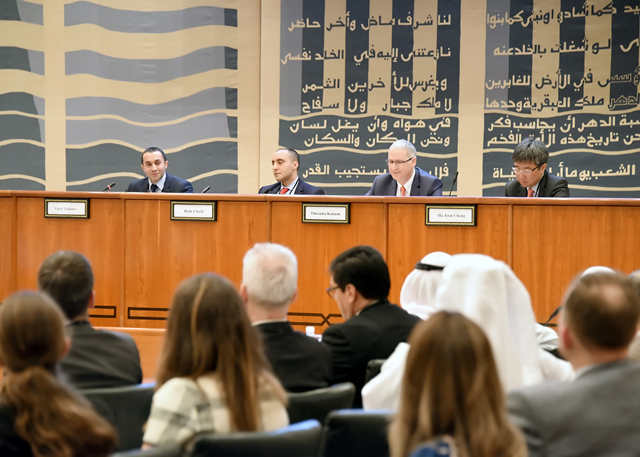Seminars, Webinars, & High-level Events
Symposium on The Path to Economic Diversification in Kuwait and other GCC Countries
May 16th, 2016

The CEF and the Arab Fund for Economic and Social Development (AFESD) jointly organized a symposium on “The Path to Economic Diversification in Kuwait and other GCC Countries” on May 16, 2016. The symposium, which is the fourth in a series that started in September 2015, featured Professor Ha-Joon Chang of Cambridge University, winner of the Wassily Leontief Prize for Advancing the Frontiers of Economic Thought, and IMF economists Reda Cherif and Fuad Hasanov.
“The adoption of a bold diversification strategy has become particularly important in the face of low oil prices, and a critical one to prevent a marked decline in GCC counties’ living standards”, said CEF Director Oussama Kanaan in his opening remarks.
Hasanov started by explaining that diversification is important because the relative incomes of major oil exporters have declined over time. He stressed on the roles of the public and private sectors in diversification, specifically in the export sector.
In his presentation, Cherif discussed policies to enhance incentives for firms to enter into diversified industries. Drawing on experiences from other resource-rich countries that succeeded in diversification, he compared the core ingredients of successful strategies in developing SMEs, development banks, venture capital funds, and export promotion agencies. He explained the merits of purpose-specific investments and strict accountability frameworks.
Professor Chang discussed diversification strategies and the role of the government in supporting diversification. He stated that “diversification need not just be related to what you are already doing. It ultimately needs to be into things that are unrelated to the natural resources”. He added that “even related diversification needs to be envisioned in more sophisticated ways. Indeed, most of the high productivity industries, in successful countries, are related to natural resources only in the remotest sense”.
On the role of the government, Chang challenged the view that governments should focus on providing things that benefit all industries equally but are likely to be underprovided by the market. According to him, “diversification requires selective (or targeted) industrial policy”.
A lively debate followed. Sheikh Mohammed Al-Sabah discussed on the experience of Kuwait in creating one of the first Sovereign Wealth Funds in the world, and Kuwait’s experience in diversifying the sources of foreign exchange earnings, and in generating revenues from energy related activities abroad. Other interventions focused on the importance of taking the global context into consideration, of defining macroeconomic stability in a broad sense, of linking diversification to subsidy reforms, of reforming the labor market and addressing unemployment, and on the role of formal education and professional training within companies. The panelists discussed the disparities among institutional frameworks across countries, as well as the limited information available on the causality between economic development and good institutions.
Press coverage:
